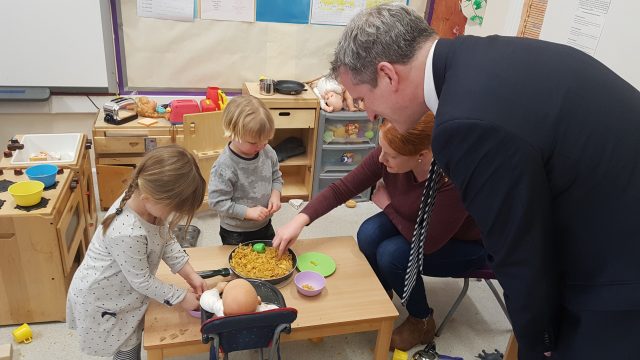
Today our blog looks at the free childcare entitlements being made available to parents as well as the Education Secretary’s ambition to visit alternative provision settings.
Childcare
Today, Tuesday 16 July, Coram Family and Childcare published its 15th annual Holiday Childcare Costs Survey, based on responses from local authorities across England, Scotland and Wales between April and June 2019. The survey found that parents face bills of around £800 for childcare over summer holidays. This was covered by the Guardian and the Express.
Since the introduction of 15 hours free childcare in 2013, more than 850,000 of the most disadvantaged two-year-olds have benefitted from this, whilst around 600,000 three and four-year olds have benefitted from a place in the 30 hours childcare scheme in the first two years.
We are also looking at the most effective ways to support parents with wrap around care for older children, which includes £26 million to kick-start and improve breakfast clubs in at least 1,700 schools.
In addition to this we are driving a society-wide aim to improve early education, including empowering parents to support their children’s learning at home through our Hungry Little Minds Campaign.
Children and Families Minister Nadhim Zahawi said:
We know some parents struggle with the cost of childcare, which is why we are spending around £3.5 billion on our early education offers this year alone. Parents are able to use their free entitlements with a range of provider types, some offering childcare all year round.
Working parents with children up to the age of 16 can also claim back up to 85% of eligible childcare costs through Universal Credit.
Over the summer holidays we are also supporting around 50,000 disadvantaged children and their parents with a programme of free activities backed by £9.1 million, and just this weekend we announced an extra £2.5 million next year to help schools open up their facilities at weekends and over the holidays as part of the School Sport Action Plan.
Alternative Provision
In an exclusive piece today, the Times wrote that the Education Secretary Damian Hinds will be visiting one in four alternative provision education settings in the next year. This coincides with today’s reception at Number 10 where the Prime Minister will be chairing her final Implementation Taskforce, bringing together government department and external organisations to address serious violence.
Education Secretary Damian Hinds said:
Everyone has an idea of what schools are like, either from their own or their children’s experiences, or watching Educating Essex or Ackley Bridge on TV. But most of us know far less about alternative provision, where children go when they are excluded from mainstream school – often because they are disengaged, or they have had problems to overcome.
We need to understand the diversity of what these schools provide, the jobs they do and the support they offer. That’s why my senior team and I have already visited at least 42 alternative provision schools, and I have made the decision that between us we will visit one in four alternative provision settings in the next year, starting immediately and spanning the country. There is the danger you end up visiting the ‘poster child’, so I’m determined we will see the full spectrum, the good and the bad, to understand it better and make the changes that need to be made.
Relationships and Sex Education
Yesterday, Monday 15 July, BBC One aired an episode of Panorama which looked at the protests in Birmingham over equalities teaching and the introduction of the new Relationships and Sex Education (RSE) curriculum from 2020.
Education Secretary Damian Hinds said:
At the heart of preparing children for life in modern Britain is making sure that they understand the world they are growing up in. It is a world that is different from 20 years ago, when this guidance was last updated, and this is a significant step that will help young people to look after themselves and each other.
A wide range of views were expressed during the public consultation, and I believe the guidance strikes the right balance. Our new guidance is clear that children should leave school having learnt about LGBT relationships.
Children will of course find out about all sorts of things, including the diversity of our society, anyway – the question is where and how is it best to do so – in class, on the internet, or in the playground. I would strongly encourage schools to discuss with children in class that there are all sorts of different, strong and loving families, including families with same-sex parents, while they are at primary school.
There is no reason why teaching children about the society that we live in and the different types of loving, healthy relationships that exist cannot be done in a way that respects everyone.
Follow us on Twitter and don't forget to sign up for email alerts.